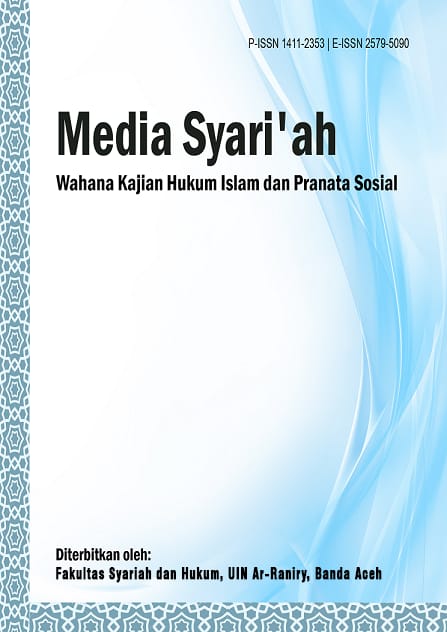Penyelesaian Sengketa Jasa Konstruksi yang Menggunakan APBN di Aceh
DOI:
https://doi.org/10.22373/jms.v21i2.3233Keywords:
Penyelesaian Sengketa, Jasa KonstruksiAbstract
Abstrak: Kontrak penggunaan jasa konstruksi tidak terlepas dari persoalan hukum manakala para pihak melakukan wanprestasi terhadap kesepakatan yang telah disepakati. Perselisihan yang terjadi memerlukan solusi untuk menyelesaikannya. Untuk menentukan bentuk penyelesaian sengketa jasa konstruksi sangat tergantung kepada isi perjanjian yang telah disepakati bersama. Namun dari 14 kontrak jasa konstruksi antara Pejabat Pembuat Komitmen dengan Penyedia Jasa hanya 4 kontrak yang menyebutkan bentuk penyelesaiannya yakni di Pengadilan, sementara yang lain mengabaikannya. Penelitian ini bertujuan untuk mengetahui Mengapa tidak dicantumkan penyelesaian sengketa dalam kontrak konstruksi?Apa hambatan dalam penyelesaian sengketa jasa konstruksi ?Apa akibat hukum jika penyelesaian sengketa jasa kontrak konstruksi tidak diselesaikan secara non litigasi terlebih dahulu?Penelitian ini menggunakan metode penelitian yuridis empiris dengan menggunakan data primer, data sekunder yakni bahan hukum primer dan bahan hukum sekunder dan data tertier. Hasil penelitian menunjukkan bahwa alasan yang mendasari tidak dicantumkan tempat penyelesaian adalah pemahaman hukum yang kurang, lebih memprioritaskan teknik pembuatannya, sudah terbiasa dengan format kontrak yang ada dan tidak adanya acuan yang baku dari Kementerian Pekerjaan Umum. Hambatan yang dihadapi dalam menyelesaikan sengketa jasa konstruksi yaitu : Pertama, Waktu Terlalu Singkat, kedua, Berganti Pejabat Pembuat Komitmen, ketiga, Disibukkan dengan Rutinitas masing-masing. Keempat, Kemampuan Komunikasi yang Belum Memadai. Konsekuensi hukum yang muncul bila penyelesaian sengketa secara non litigasi tidak dilakukan terlebih dahulu adalah dapat membuat persetujuan secara tertulis mengenai tatacara penyelesaian sengketa, termasuk dapat membuatkan penyelesaian perkara di pengadilan.
Abstract: Contracts for the use of construction services are inseparable from legal issues when the parties make a breach of an agreed agreement. Disputes that occur require a solution to solve them. To determine the dispute resolution form of construction services is highly dependent on the contents of agreements that have been agreed upon. However, of the 14 construction service contracts between the Committing Officer and the Service Provider, only 4 contracts specify the settlement in the Court, while others ignore it. This study aims to find out why not mention the settlement of disputes in construction contracts? What are the barriers in the settlement of construction service disputes? What are the legal consequences if the settlement of construction service contract dispute is not settled non litigation first? This research uses empirical juridical research method using primary data, secondary data that is primary law material and secondary law material and tertiary data. The result of the research shows that the underlying reason is not the place of completion is the lack of understanding of the law, prioritizing the manufacture technique, is familiar with the existing contract format and the absence of standard reference from the Ministry of Public Works. The obstacles encountered in resolving construction service disputes are: First, Time Too Short, second, Switch to Committing Officer, third, Busy with each Routine. The legal consequences that arise when a non-litigation dispute resolution is not done in advance is to make written approval of the dispute settlement procedure, including for making court settlement possible.
References
Fuady, M. (2002). Pengantar HukumBisnis. PT. Citra Aditya Bakti.
Fuady, M. (2013). Teori-Teori Besar (Grand Theory) dalam Hukum. Kencana.
HS, S. (2015). Hukum Kontrak Teori & Teknik Penyusunan Kontrak. Sinar Grafika.
Khairandy, R. (2013). Hukum Kontrak Indonesia dalam Perspektif Perbandingan. Grafika.
Machmudin, D. D. (2003). Pengantar Ilmu Hukum Sebuah Sketsa. Refika Aditama.
Muyassir, wawancara, 12 April 2018.
Pouna Faisal, wawancara, 1 April 2018.
Prajitno Djojowisastro, wawancara, 15 April 2018.
Purwosusilo. (2014). Aspek Hukum Pengadaan Barang dan Jasa. Kencana.
Subekti. (2005). Pokok-Pokok Hukum Perdata. PT. Intermasa.
Sutendi, A. (2009). Aspek Hukum Pengadaan Barang dan Jasa dan Berbagai Permasalahannya. Sinar Grafika.
Widjaya, I. G. R. (2003). Merancang Suatu Kontrak (Contract Drafting, Teori dan Praktik). Kesaint Blanc.
Witanto, D. Y. (2012). Dimensi Kerugian Negara dalam Hubungan Kontraktual (Suatu Tinjaun Terhadap Risiko Kontrak dalam Proyek Pengadaan Barang/Jasa Instansi Pemerintah. Mandar Maju.
Abdul Aziz, wawancara, 15 April 2018.
Achmad Ali, W. H. (2012). Menjelajahi Kajian Empiris terhadap Hukum. Kencana Prenada Media Group.
Ahmad Yani, wawancara, 9 April 2018.
Ahmad Yani, wawancara, Penyedia Jasa, 2 April 2018.
Fathurrahman, wawancara, 2 April 2018.
Yusdi, wawancara, 14 April 2018.
Zulkarnen, wawancara, 8 April 2018.
Downloads
Published
Issue
Section
License
MEDIA SYARI'AH: Wahana Kajian Hukum Islam dan Pranata Sosial has CC-BY-SA or an equivalent license as the optimal license for the publication, distribution, use, and reuse of scholarly work. Authors who publish with this journal agree to the following terms:
1. Authors retain copyright and grant the journal right of first publication with the work simultaneously licensed under a Creative Commons Attribution-ShareAlike 4.0 International License that allows others to share the work with an acknowledgment of the work's authorship and initial publication in this journal.
2. Authors are able to enter into separate, additional contractual arrangements for the non-exclusive distribution of the journal's published version of the work (e.g., post it to an institutional repository or publish it in a book), with an acknowledgment of its initial publication in this journal.
3. Authors are permitted and encouraged to post their work online (e.g., in institutional repositories or on their website) prior to and during the submission process, as it can lead to productive exchanges, as well as earlier and greater citation of published work (See The Effect of Open Access).
You are free to:
Share — copy and redistribute the material in any medium or format.
Adapt — remix, transform, and build upon the material for any purpose, even commercially.
The licensor cannot revoke these freedoms as long as you follow the license terms.
All papers published in MEDIA SYARI'AH: Wahana Kajian Hukum Islam dan Pranata Sosial are licensed under a Creative Commons Attribution-ShareAlike 4.0 International License.




.png)


.png)
.png)
.png)



